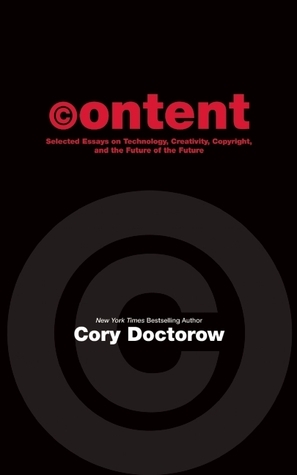Content collects several of Cory Doctorow’s favorite pieces of his written on “technology, creativity, copyright, and the future”, clumping in the mid-2000s. The content is mixed in medium, but united in message: herein are essays, speeches, and interviews that cover technology and creativity, with the occasional obstacle of law. Doctorow began his life’s work in libraries and bookstores, but took note of the bookwarez scene as it emerged in early Usegroups — committed to the scanning and electronic sharing of books — when he shifted into tech and began writing science fiction. If, he figured, people are going to spend hours disassembling, scanning, and sharing books regardless of the law — and science fiction books are especially popular for scanning and sharing — why not simply….offer an ebook version of the book to whosoever wants it? A clean copy, with no OCR errors and with the author’s blessing? Doctorow took a gamble that he could gain more readers through exposure, and thus indirectly, more buyers. Yes, some people may be content with reading an ebook copy, but once hooked they might elect to buy a physical copy they can read outside, or give to a friend. This is not that similar from the early shareware approach of video games, in which the first levels of a game were freely available to play & make copies of, but the full version had to be sent for by mail. Although Doctorow pursued this on a hunch, he also believes that stringent copy protection of ideas is both impossible given the nature of the internet, and ultimately bad for artists and human creativity in general.
In later books he’s advanced this more, writing in Information Doesn’t Want to be Free that there are other models creatives can pursue, like the ‘subscriber’ model employed by Substack, YouTube, and Patreon. Doctorow attacks some legal and technical hurdles directly: his cheeky opening piece is a speech he gave to Microsoft on why it should abandon intrusive digital rights media software, or DRM: I say “cheeky” because Bill Gates famously penned “An Open Letter to Hobbyists” decrying those who copied software and shared it for free, denying programmers like himself sales. Much of the book remains relevant today, like Doctorow’s observations that most ‘consumers’ of media, be it stories or music, pursue ease of use over quality: they prefer an mp3 player packed with low-quality mp3s that they had control over, to something like a Sony Music Clip that offered better quality but few sharable options. This sometimes causes changes in the way creative works are delivered: because most people listen to songs by themselves, not as part of albums, the idea of concept albums has largely faded. There are dated elements, but for those of us who were plugged in in the mid-2000s, that adds its own nostalgic interest: I was interested in his defense of early Wikipedia, and amused by his confident proclamation that facebook would go the way of MySpace, because the more people it attracted, the more negative interactions would grow around it — moving people to ditch the platform for others. I’m told the whippersnappers have moved on these days, and I’m so out of the loop I can’t even go for laughs by guessing at outdated platforms — but facebook is still a giant as far as web traffic goes. right behind Google & YouTube for monthly views.

